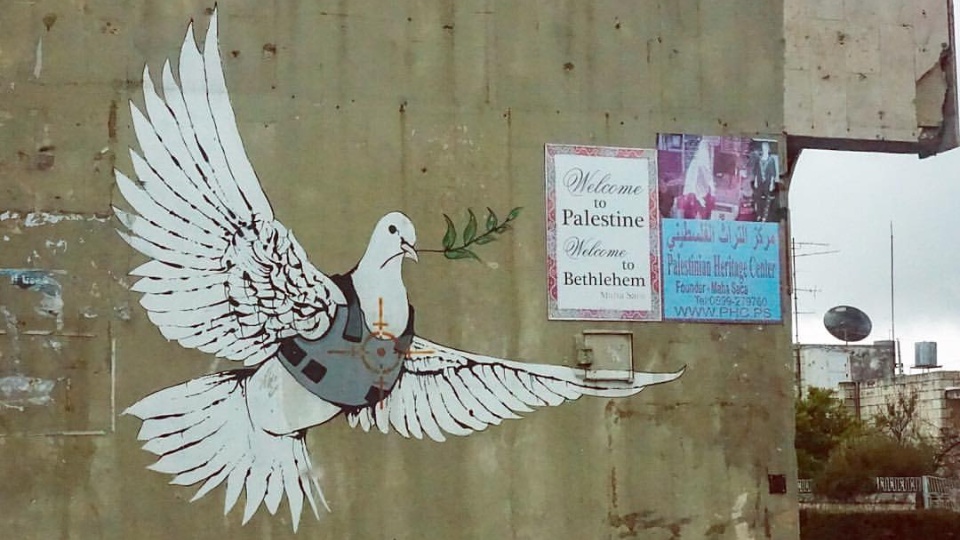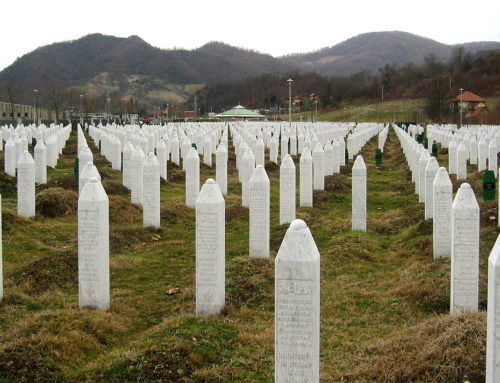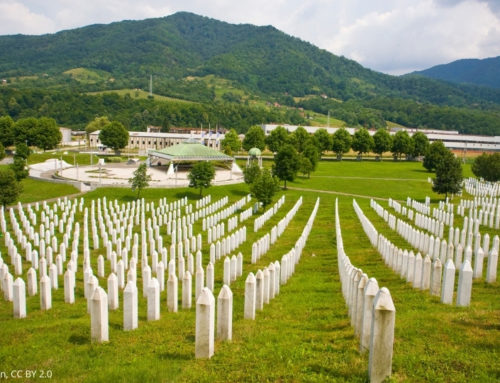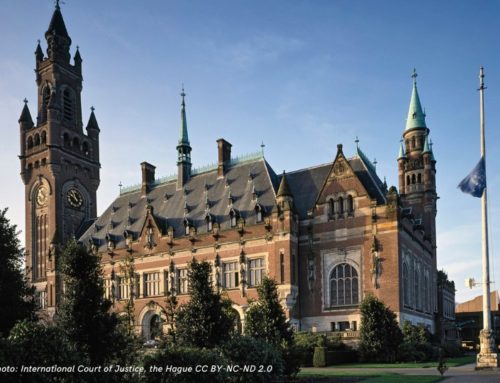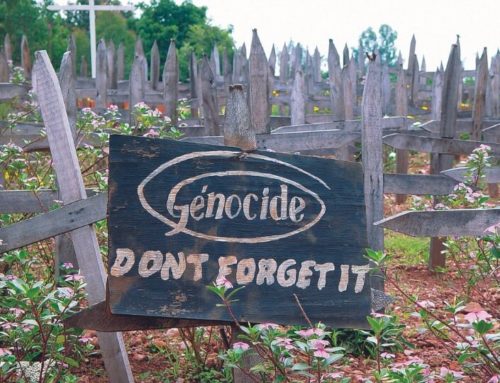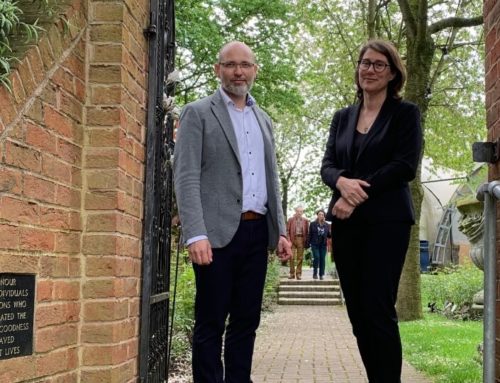In this post (also published in the Jewish News), Aegis Trust Founder and UK National Holocaust Centre President Dr James Smith unpacks the genocidal nature of Hamas ideology, and why it needs a war with Israel in which Palestinian civilian deaths draw more support to its cause. He ends on a note of hope for future peace, if exceptional leadership can be found on both sides.
In coming days Israel will likely undertake a ground offensive in Gaza, aiming to eradicate Hamas and defend itself from terrorism. A challenging operation, given the vast network of underground tunnels protected by human shields; both Israeli hostages and innocent Palestinians. As the situation evolves rapidly the 7th October pogrom in which Hamas murdered over 1300 people must be called what it is: an act of terror, by terrorists.
What does it matter, so long as the BBC describe the atrocities (which they have)? It matters because when the BBC accept that the British who died in the Manchester Arena in 2017 and Australians murdered in Bali in 2002 were victims of terrorism, yet imply 260 Jewish festival-goers slaughtered in Israel were not, the corporation becomes complicit in the hideous view that Jewish youth, disabled, elderly and even Jewish babies could be legitimate targets of a military campaign by Hamas. That’s relevant because members of Fatah’s Central Committee have praised the atrocity, indicating they will work with Hamas to replicate it in the West Bank.
When people accuse Israel of genocide in Gaza, media organizations do a disservice to peace not to inform them about the nature of Hamas, who advocate a policy of genocide against Israelis and Jews. Some protestors must know this already, as they chant in streets of London “From the River to the Sea” meaning the land of Israel, between the Jordan River and the Mediterranean Sea, will be emptied of Jews.
“How many people listened to what the Nazis were saying?”, my late Holocaust survivor friend, Waldemar Ginsburg, used to ask. We have learned that when political leaders say they will exterminate a group of people, especially in a context of sustained conflict, it is prudent to believe them.
Revolutionary movements can begin in violence and migrate away from it. Not so Hamas, an offshoot of the Muslim Brotherhood, founded in 1987 just before the Palestine Liberation Organisation (PLO) verbally renounced violence in 1988. In the period leading up to the 1993 Olso Accords Hamas established itself as a reaction to the secular PLO’s recognition of Israel’s right to exist. The First Intifada between 1988 and 1993 was not initiated by Hamas, but their co-founder Ahmed Yassin exploited the unrest and called for suicide bombings in Israel, a hallmark of a terrorist organization. Killed in an Israeli strike, he is esteemed today as their spiritual founder.
Denying Israel’s right to exist causes Israelis to feel an existential threat; one reinforced by the speeches of Hamas’ ideological leaders. Earlier this year the 7 April sermon of the official Sheikh of Hamas, Hamad Al-Regeb, was posted on the YouTube channel of Gaza’s Al-Abra mosque in which he called Jews filthy ugly animals, the brothers of pigs and apes and praised martyrdom asking “What could be more beautiful than ending your life by dying for the sake of Allah?” Then he prayed “Oh Allah, bring annihilation upon the Jews. Paralyze them and destroy their entity (Israel). Oh Allah, enable us to get to the necks of the Jews.”
Matters have not been going Hamas’ way in recent years. Even with Iran’s support, it was unlikely to defeat Israel’s military or achieve its aims of genocide against the Jewish people. After a quarter century in which only two Arab States recognized Israel’s right to exist, change was in the air. Since 2020, three more states – the UAE, Morocco and Bahrain – developed diplomatic relations with Israel as part of the Abraham Accords. Others considering recognition included Sudan, once home to al-Qaeda. Most significantly Saudi Arabia was in discussions with Israel, which must have caused consternation in Iran, a longstanding rival for regional dominance.
Arab nations forming relations with Israel are not selling out the Palestinians. On the contrary. They are committed to a safe and prosperous homeland for Palestinians. If a trend of growing ties continued between Israel and Arab nations, Israelis could begin to feel secure, while their new partners would bring considerable leverage to advance a two-state solution. Investment in a viable Palestinian state would herald a new era in which both Israelis and Palestinians could flourish. Until October 7th, some dared to hope such peace was a possible trajectory.
Israelis and Palestinians compromising and thriving as neighbours is anathema to Hamas and Iran because this would require acceptance that Israelis have a right to exist.
To my Israeli friends, excuse the impertinence of the following observations. I am not attending funerals of friends killed by terrorists and don’t have children running to shelters in the middle of the night. However, despite the wounds and anger, I beg to stand back and ask: What does Hamas want to gain from this horrific act of terrorism?
Hamas needs war with Israel. Needs its own people to die. Needs suffering Palestinian children to be seen daily. Needs anger across the world.
Hamas knows Palestinian civilians will die, and that when they do, the only winner will be Hamas and its ideology. It knows it will stop other Arab nations recognizing Israel’s right to exist. It knows Iran will gain cover to coordinate Hezbollah to open a second front in the north of Israel and that Syria may join the war too.
After 9/11 the War on Terror led by the U.S. and U.K. gifted al-Qaeda a recruitment drive for terrorism, giving birth to ISIS. To avoid the same mistakes, the IDF must not be co-opted by Hamas to achieve its ends. Now they have revealed their true nature to the world, including their own people, even in this time of war Israel needs to make allies with Palestinians who reject terrorism.
A positive outcome is narrowly possible for both sides of the conflict but requires extraordinary leadership from Israelis and from Palestinians, who need to find it within themselves to see the humanity in each other. Leaders are needed who can imagine a new world of peace, beyond the trauma.
Nazi hunter Simon Wiesenthal’s motto was justice, not vengeance. The most powerful way to defeat Hamas is for the ground offensive of Gaza to be conducted while upholding international humanitarian law, with as much compassion for the Palestinian child as the zeal to protection of Israel’s children. At the same time, a withdrawal strategy and Marshall-type plan to rebuild Gaza should be planned and announced. This could be undertaken with cooperation of Arab States prepared to acknowledge Israel’s right to exist, with a promise to restore peace and prosperity for Palestinians once Hamas is gone.
In times of fear, if we allow our humanity to be eroded, the terrorists win. Hate never defeats hate but breeds more hate. The greatest legacy of Holocaust survivors is not their stories of survival. It is that they defeated the aims of the Nazis when they preserved their own humanity.
Dr James M. Smith
Founder of the Aegis Trust for genocide prevention; President and co-founder of the UK National Holocaust Centre & Museum
The Aegis Trust encourages all readers concerned about the plight of suffering Israeli and Palestinian civilians to contribute to charities which are active on the ground. These include Red Crescent, Magen David Adom and Islamic Relief.
Article image source: www.flickr.com/photos/katecarsonphotos/23765912529, published under Creative Commons licence CC BY-ND 2.0

